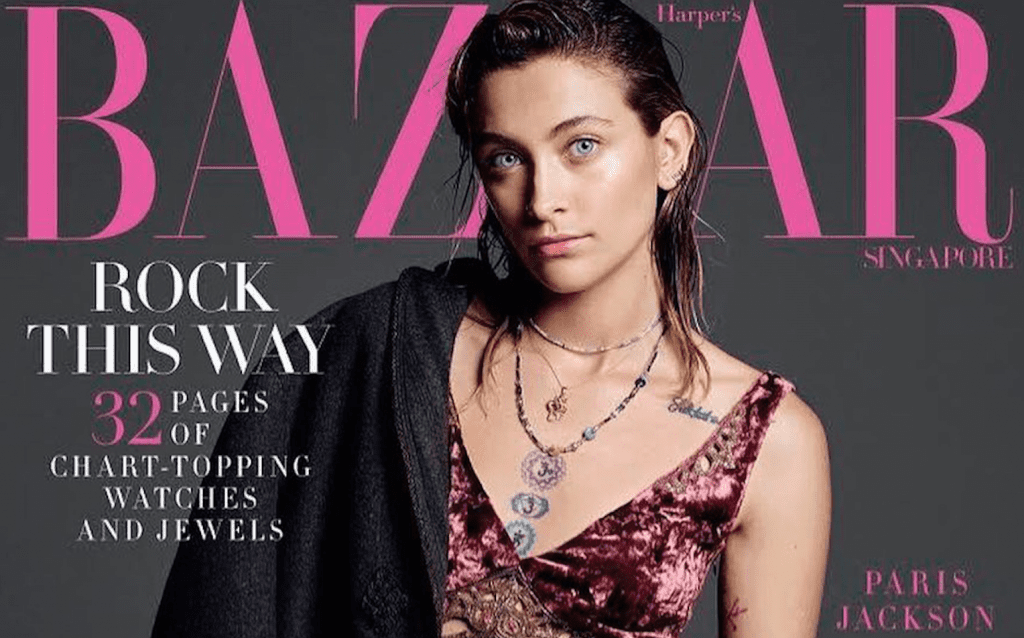Over the weekend, TMZ reported in an “exclusive” article that Paris Jackson “was hospitalized Saturday after she attempted suicide.” The second eldest child of the late Michael Jackson rebutted the claim on Twitter hours after the article was published, calling the claims “lies” and putting forth some choice “f” words for the wildly popular tabloid news website. In response to Ms. Jackson’s denial, hordes of social media followers urged the 20-year old to initiate legal action over the allegedly untrue report.
TMZ’s widely-read report – complete with exclusive imagery and nearly 9,000 reader comments – falls neatly in line with the workings of the long-standing tabloid industry, in which outlets regularly chronicle the daily activities of the world’s biggest celebs. This includes their daily comings-and-goings, from coffee runs to airport sightings. These celebrity news outlets also often peddle salacious and utterly click-able dirt on famous figures, whether it is news of infidelity or photos from drunken outings. The reports on Ms. Jackson clearly fall into the latter camp.
Given the controversial nature of much of the reporting that tabloids put forth, questions of legality – posed by the very people whose lives serve as the fodder for these print and digital publications – have run rampant. One lawsuit almost invariably serves as a common thread for modern celebrity-initiated defamation suits against publishers: the case that actress Carol Burnett filed against the National Enquirer almost 50 years ago.
In 1976, the Enquirer published a splashy article detailing a seemingly intoxicated encounter between many-Emmy Award-winning actress Carol Burnett and then-Secretary of State Henry Kissinger. According to the Enquirer, “In a Washington restaurant, a boisterous Carol Burnett had a loud argument with another diner, Henry Kissinger. Then she traipsed around the place offering everyone a bite of her dessert. But Carol really raised eyebrows when she accidentally knocked a glass of wine over one diner and started giggling instead of apologizing.”
Both Burnett and Kissinger denied the accuracy of the Enquirer’s report, prompting the paper to publish a retraction. Shortly thereafter, Burnett would sue for libel – which is defamation, or any statement that hurts someone’s reputation, expressed by print – in Los Angeles Superior Court, asserting that such events never occurred. The immediate hurdle in the case fell on Burnett. In order to make a successful defamation claim, she – as a public figure – would have to show that the Enquirer acted with “actual malice.” That was the standard established by the Supreme Court in its 1964 decision in New York Times v. Sullivan – and what remains as good law.
In other words, Burnett would have to demonstrate that the Enquirer knew for sure that the information it published was false, and decided to publish it anyway. This is no small feat for a plaintiff, and yet, Burnett’s legal team was able to show that while an informant for the Enquirer had, in fact, witnessed Burnett offering up her soufflé to other diners, he reported back that she was “not drunk,” and Kissinger was not mentioned in his report at all.
After 2 days of deliberations in March 1981, an 11-member jury awarded Burnett nearly $2 million, a damages amount that was ultimately reduced to $200,000 on appeal, before the parties settled out of court for an unspecific sum of money.
Burnett, herself, was unphased by the money, telling the press at the time that she would donate whatever she pocketed to charitable causes. For her, the case was an important way to set a precedent, and that is precisely what it did. As the New York Times reported in 1981, the “lawsuit has been closely followed in Hollywood, where almost a dozen other celebrities have lawsuits pending against the weekly tabloid.” The Atlantic called the case that start of the “modern era of tabloid litigation.”
The case has, in fact, spurred a bevy of defamation suits by big-name celebrities in the U.S. with varying results and more frequently, confidential out-of-court settlements. Those cases have ranged from the one Katie Holmes filed suit against Star Magazine in 2011 (and subsequently settled), accusing the tabloid of falsely suggesting that she was a drug addict to the defamation suit that Hulk Hogan famously initiated against Gawker, which resulted in a $140 million damages award from a jury in early 2016, followed by a settlement.
As for TMZ, the website has been named in a handful of defamation suits, but has not yet lost a case in court, which “is not to say its reporting has been infallible,” though, as BuzzFeed News’ Anne Helen Petersen stated in a 2014 article, entitled, “The Down And Dirty History Of TMZ.” According to Peterson, “The site retracted a 2012 story about Janet Jackson slapping Paris Jackson and claimed that [the still very much alive] Lil Wayne was being read last rites after an overdose [in 2013].”
14-year old TMZ – and many other popular celebrity news sites – have largelyremained out of court even when claims might otherwise be deemed inaccurate, in part, because of the procedural difficulty that a public figure will inevitably face in his/her attempt to make a successful defamation case. Another detractor? The track record of these outlets to aggressively fight back against such suits, making the cases particularly time-consuming and expensive for all.
But maybe even more than that, Petersen states, there is a reluctance to sue for many celebs due to “The Streisand Effect,” a term used to describe “the way in which attempts to cover up a secret ultimately end up publicizing it even more.” In other words, suing “TMZ [to prohibit it] from using a video, photo, or other piece of information becomes tantamount to publicizing that activity.”
Whether that will pan out in the recent Paris Jackson, TMZ, he said, she said instance, is yet to be seen.











